Imagine a bustling office brimming with potential, yet held back by missed calls, network glitches, and the consequent loss of potential customers. Does this sound like your business? It’s a situation many enterprises encounter and one that needs the best VoIP service to overcome.
Your business’s success critically depends on customer experience, and ensuring quality in customer interactions immensely boosts the experience. But unfortunately, most businesses are not where they should be in customer communications.
Studies suggest that 30% of business phone calls go unanswered. This is a massive loss for businesses and signifies a negative customer experience.
Additionally, Birdeye research shows that 62% of consumers who face a negative experience move on to a competitor.
VoIP services, in response, offer a solution by improving lead conversion rates, enhancing customer experience, and boosting business productivity and brand loyalty.
The right VoIP service provider can help you turn every call into a business opportunity. Read this blog post to learn more about VoIP services and pick the best VoIP service for your business.
Table of contents
- What is VoIP?
- What is a VoIP number?
- How does VoIP work?
- 8 best VoIP service providers for your enterprise
- How much does VoIP cost?
- Pros and cons of VoIP: A close look at VoIP features and benefits
- What are the various types of VoIP services?
- How to choose the best VoIP service for your business
- Pick the right VoIP service with a tailored approach
- Frequently asked questions about best VoIP services
- Grow your business with Birdeye Messaging
What is VoIP?
VoIP or Voice over Internet Protocol is a communication system that uses the internet to make calls, unlike a traditional landline telephone. VoIP services convert speech into small digital signals and transmit them over the internet or similar networks.
You can use VoIP on computers, tablets, smartphones, and other VoIP-enabled devices to make and receive calls.
VoIP services for businesses include unlimited international calling, voicemail, call recording, caller ID, voicemail-to-text/email, etc.

What is a VoIP number?
A voice-over-internet protocol or VoIP number is a virtual phone number that allows users to make phone calls over the Internet. The service assigns them to a user instead of a location (as with landline numbers.)
VoIP numbers are flexible, accessible, compatible across multiple devices, and cost-effective.
How does VoIP work?
VoIP technology is quite simple. With it, you use the internet to make phone calls and transmit messages instead of over traditional communication systems.
Earlier, businesses had landline telephones that used copper wire to transform the call into its analog form for transmission.
However, VoIP converts the voice information into digital signals for transmission and reconverts it into analog form at the receiving end. This is to improve efficiency and provide more features for the end-user.
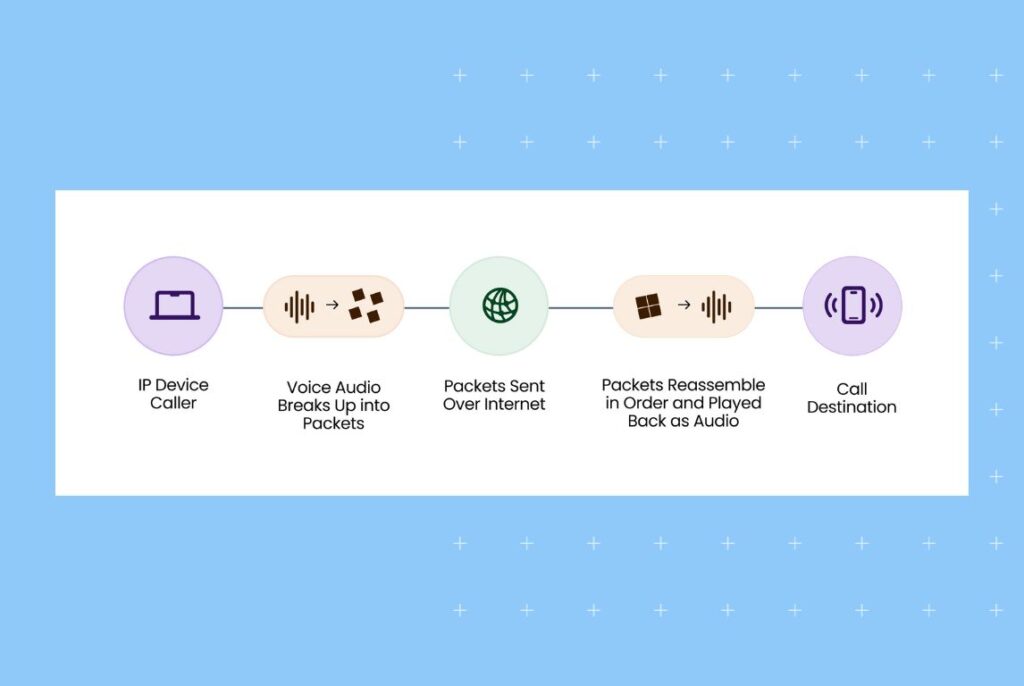
Here is a quick breakdown of how VoIP works:
- VoIP uses hardware that can receive and transmit data over the internet. This is usually a computer with a modem, smartphone, phone with an adapter, or VoIP-enabled mobile phone.
- The VoIP service provider sets up sophisticated algorithms or server routes to route calls from one user to another. This also includes a bridge to traditional communication systems to call landline phones.
- VoIP then uses your stable internet connection to communicate the message through a network packet. This is where the digital-to-analog conversion of voice messages takes place.
8 best VoIP service providers for your enterprise
While many VoIP service providers are available to enhance business communication, customer experience, and productivity, a select few significantly outperform the rest.
Here is a list of some of the best VoIP services for your enterprise:
- RingCentral MVP
- Intermedia Unite
- 8X8
- Dialpad
- Vonage business communications
- Nextiva
- Ooma office
- Zoom Phone
Let us briefly examine their features and functionality in the following section.
1. RingCentral MVP
RingCentral is a cloud-based communication system that offers messaging services, unlimited calling, business texting, and similar services. Specifically, the RingCentral MVP service stands for “messaging, video, and phone.”
This VoIP service has been a leader in helping enterprises improve communication, productivity, and collaboration.
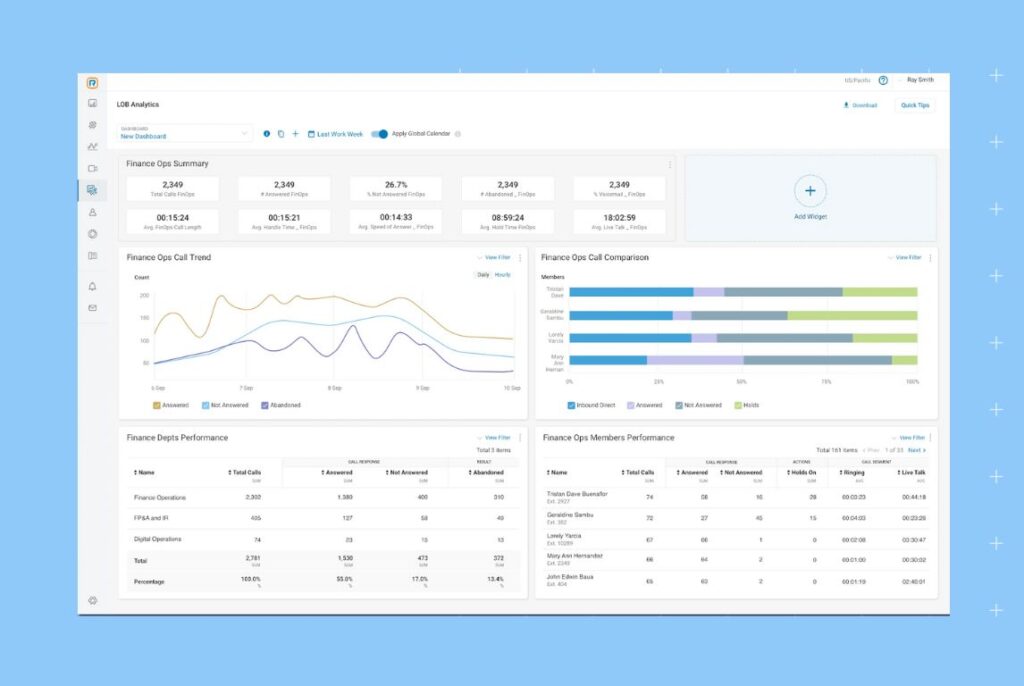
One of the best parts about RingCentral MVP is that it provides a well-rounded approach to business communication needs. You can do more than just answer calls with this service.
With RingCentral MVP, enterprises can:
- Connect with customers and team members globally with the VoIP phone number.
- Route customers to the right agent with built-in IVR options.
- Analyze the productivity across departments and customer interactions with in-built analytical tools.
- Handle large call volumes with minimum downtime.
- Streamline their business operations by integrating with 300+ systems across HubSpot, Microsoft Teams, Salesforce, Zoho, and Google Workspace.
- Setup call forwarding to avoid missing important calls.
- Manage calls from a browser, app, and any device for management on the go.
- Make international calls at reasonable prices.
- Leverage AI technology in call analysis, transcription, and video meeting insights.
2. Intermedia Unite
Intermedia Unite is a VoIP service for medium to large businesses’ communication needs. They offer popular VoIP phone features like business messaging, team messaging, unlimited calling, HD video calling, conference calls, and faxing.
One of the major attractions of this service is that they offer bundles with free phones, cameras, or headsets. This offering helps businesses get all their needs from a single vendor.
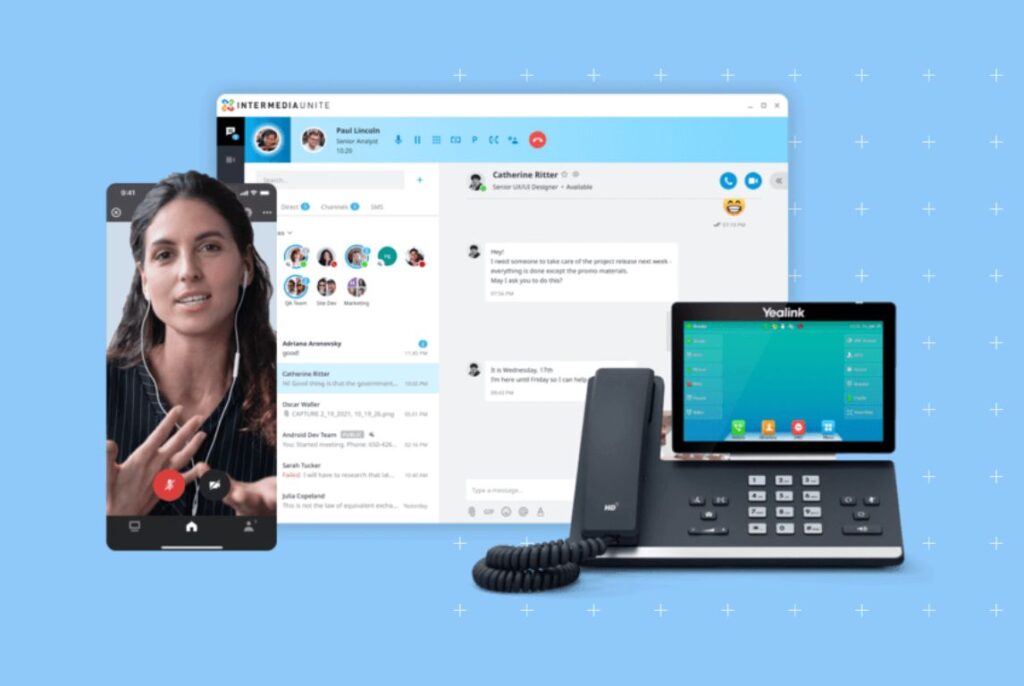
Intermedia Unite also integrates with most third-party software (free and paid) to help businesses manage their CRM processes.
They offer two plans: the Unite Pro plan and the Enterprise plan. Sought-after services like a toll-free number, Salesforce integration, and a dedicated account manager are available in the Enterprise plan, but not in the Unite Pro plan.
With Intermedia Unite, businesses can:
- Manage customer and team communications across multiple devices, boosting productivity.
- Integrate their VoIP service with Microsoft Teams for easy management.
- Implement a call center with built-in features like an automatic call back, call forwarding, voicemail to text, and voicemail transcription.
- Route calls to the right team member with IVR.
- Analyze the productivity of team members with analytics features.
3. 8X8
The 8X8 experience communications platform is handy for all businesses looking to streamline communication. It provides businesses with VoIP phone systems, business messaging, team chat, video conferencing, advanced call analytics, and call center features.
The business also has an efficient customer service team for onboarding and managing the service on the go.
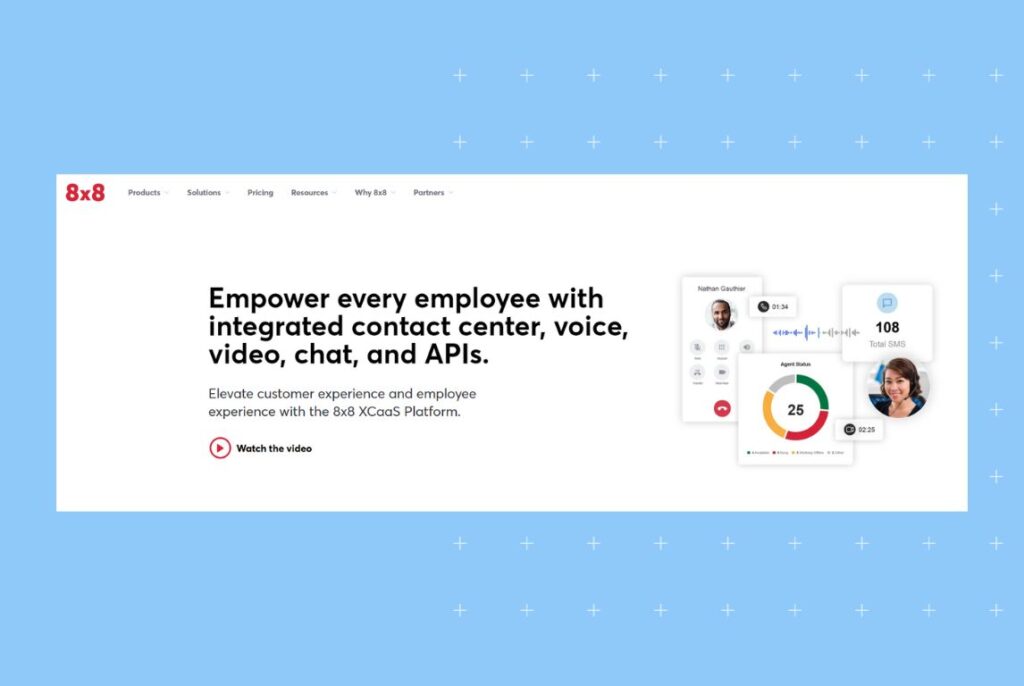
Some of the top features of the 8X8 include:
- Call handling features like call forwarding, call monitoring, call transfer, and 3-way calling.
- Advanced call routing to reduce wait times and enable the caller to get answers with intuitive tools.
- In-depth call analytics with insights into the service the business provides, including speech analysis, sentiment analysis, and trend identification across conversations.
- Integrations with essential third-party software such as HubSpot, Microsoft Teams, Outlook, Salesforce, Workspace, Freshdesk, etc.
4. Dialpad
Dialpad is one of the best VoIP services in the softphone category.
With a softphone, businesses can make phone calls without a handset or VoIP-enabled hardware. The calls go through the internet, and service providers like Dialpad provide a desktop app or web application that makes the connection possible.
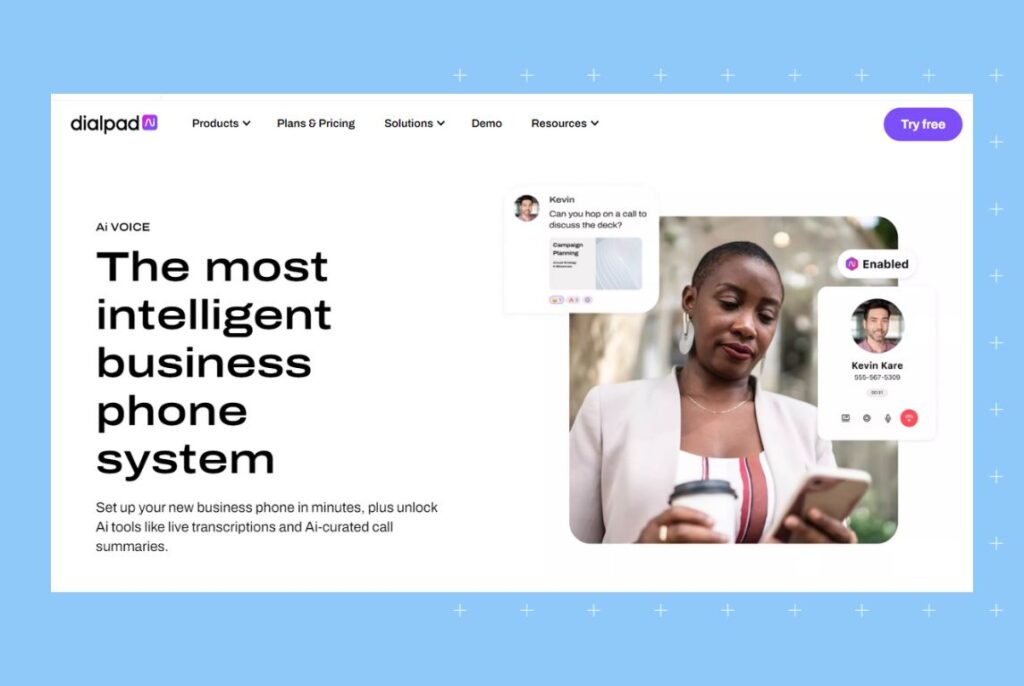
Softphone systems are ideal for businesses with remote employees spread across the globe. Instead of shipping headsets, they can use Dialpad to connect with customers and bring teams closer.
Dialpad also supports VoIP services over handsets, but the business focuses more on softphone services.
With Dialpad, businesses can:
- Access unlimited calling, SMS, MMS, and call managing features like voicemail greetings, voicemail transcription, call forwarding, etc.
- Set up the communication service and integrate it with HubSpot, Salesforce, Zapier, Zendesk, Slack, and other third-party software.
- Leverage the built-in AI/Voice intelligence to understand call analytics with call transcript, critical moment identification, and caller details.
- Secure a local number to gain trust in the market, especially if they are a multi-location business.
- Enjoy the highest uptime possible with very minimal outages and call drop incidents.
5. Vonage Business Communications
Vonage Business Communications is one of the oldest names in the VoIP industry. Their experience enables them to provide high-quality service for enterprises.
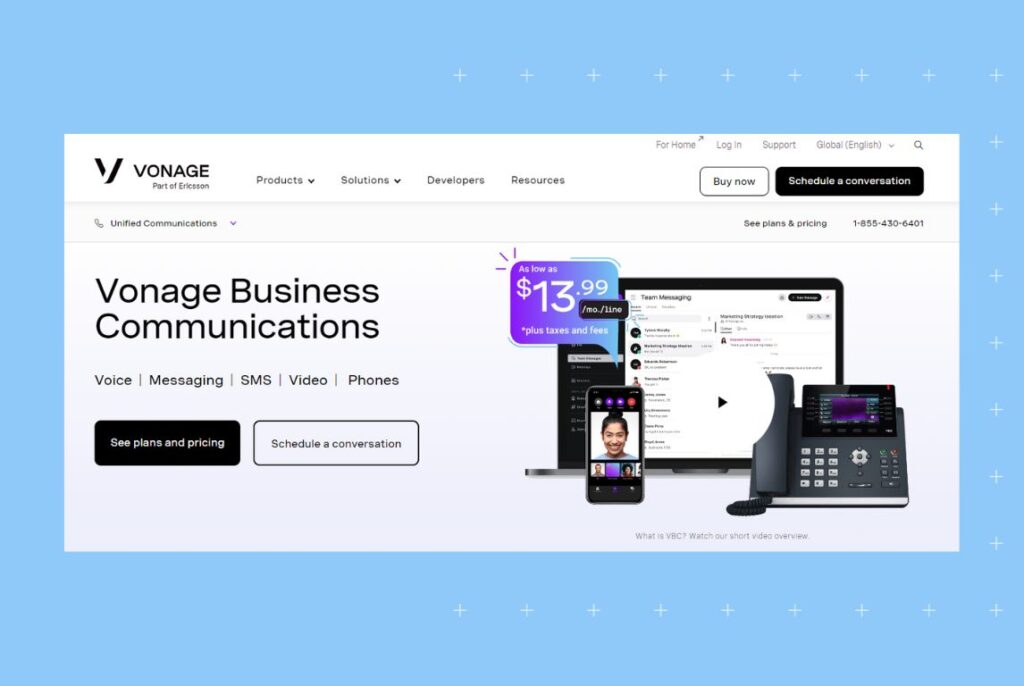
The business may not be at the forefront with popular VoIP features like interactive UI, self-management, and integration capabilities. However, it is still one of the best VoIP services due to its ability to provide custom solutions and assist businesses effectively.
Some of the top features of Vonage include:
- A suite of options for management, including desktop apps, mobile apps, desk phones, and video conferencing.
- Inclusive messaging channels like SMS, MMS, and Facebook Messenger to communicate with customers.
- Call handling features such as call forwarding, call routing, call recording, and other contact center capabilities.
- Toll-free number addition for your business.
- A customizable admin portal that helps manage, monitor, and streamline business communications.
- An integrated chatbot to identify/monitor customer conversations by tagging each contact accordingly.
6. Nextiva
For businesses that need unlimited access to calls, including video calls, Nextiva is a good VoIP service. The platform allows businesses to set up unlimited calls, video conferencing, business messaging, and team messaging.
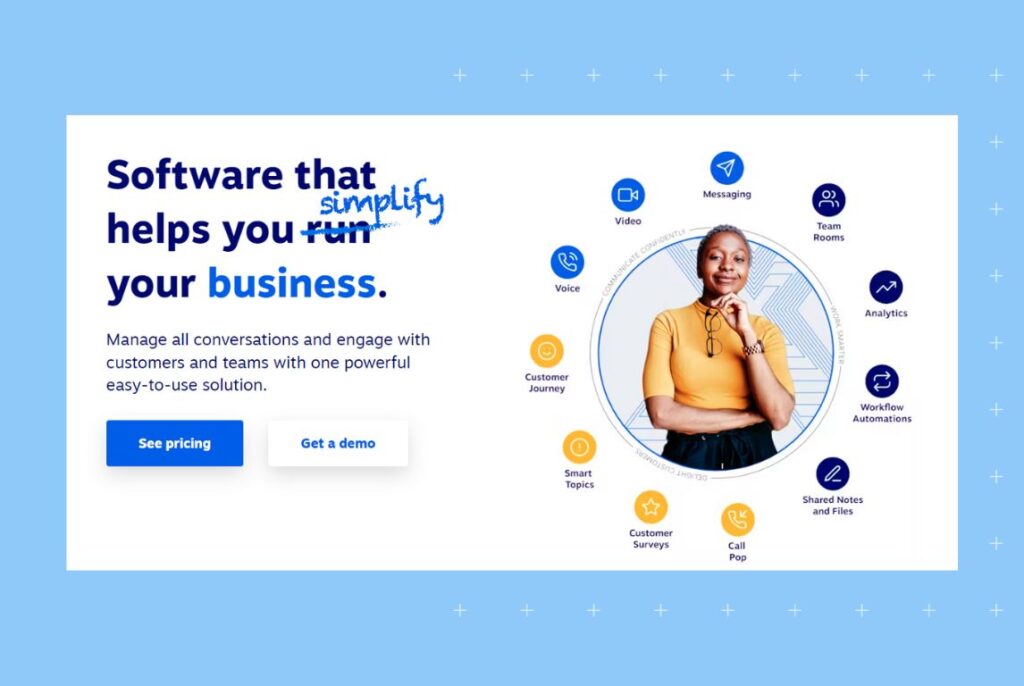
The conference call feature especially allows businesses to set up team calls without worrying about downtime or privacy concerns.
Some of the most salient features of Nextiva include:
- A unified dashboard that brings all customer communications under one window.
- Productivity tools like call recording, file management, calendar settings, etc.
- Customer analytic tools that allow you to monitor call performance, call quality, call rating, and identify trends.
- Integrations with third-party tools like Salesforce and Hubspot to track leads, customer conversion rates, and more.
7. Ooma office
Ooma office has been touted as one of the best VoIP service providers for enterprise businesses due to its pricing options and features. Businesses can avail of unlimited calls across the United States, Mexico, and Canada in a cost-effective package.
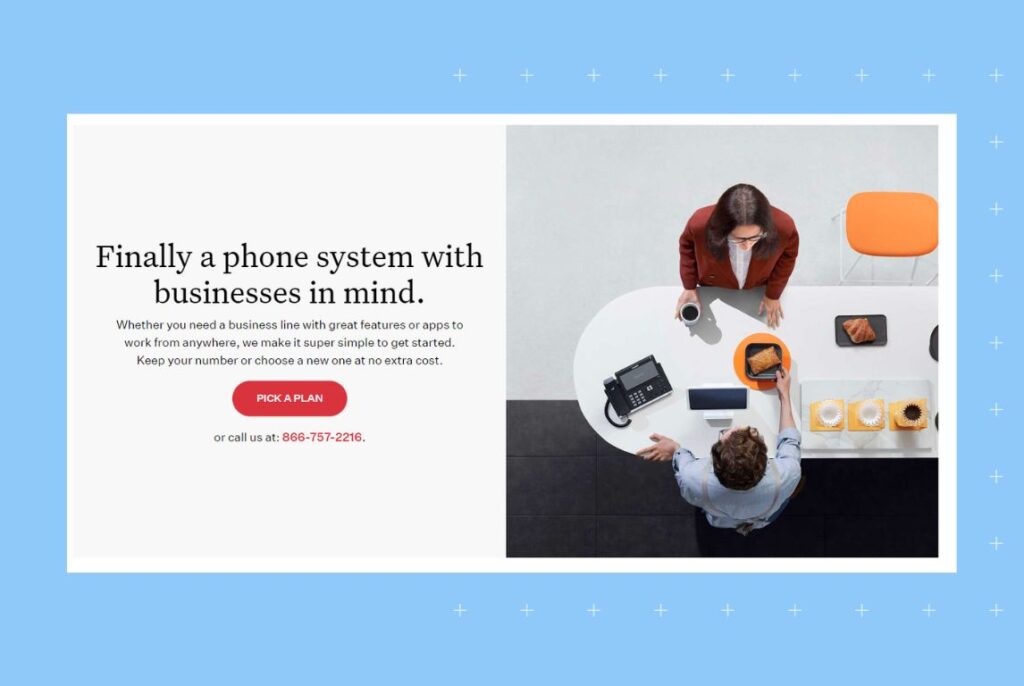
This tool also provides SMS, video calls, contact syncing, call transcription, integrations with third-party software, and so on.
Some of the other top features of the Ooma office include:
- Easy installation process and a contract-less approach that allows you to cancel anytime.
- Toll-free numbers and number porting options for businesses wanting to retain their contact details.
- A robust mobile app that allows businesses to manage communication easily
- Voicemail features such as caller ID, call waiting, and voicemail transcription.
- Receptionist features to route calls to the right agent
- Hotdesk features that route calls to a specific business number after operational hours.
8. Zoom Phone
Zoom is already pretty popular with businesses as their go-to solution for video conferencing needs. But Zoom also offers business phone solutions in the US and Canada for international calling, texting, and team collaboration needs.
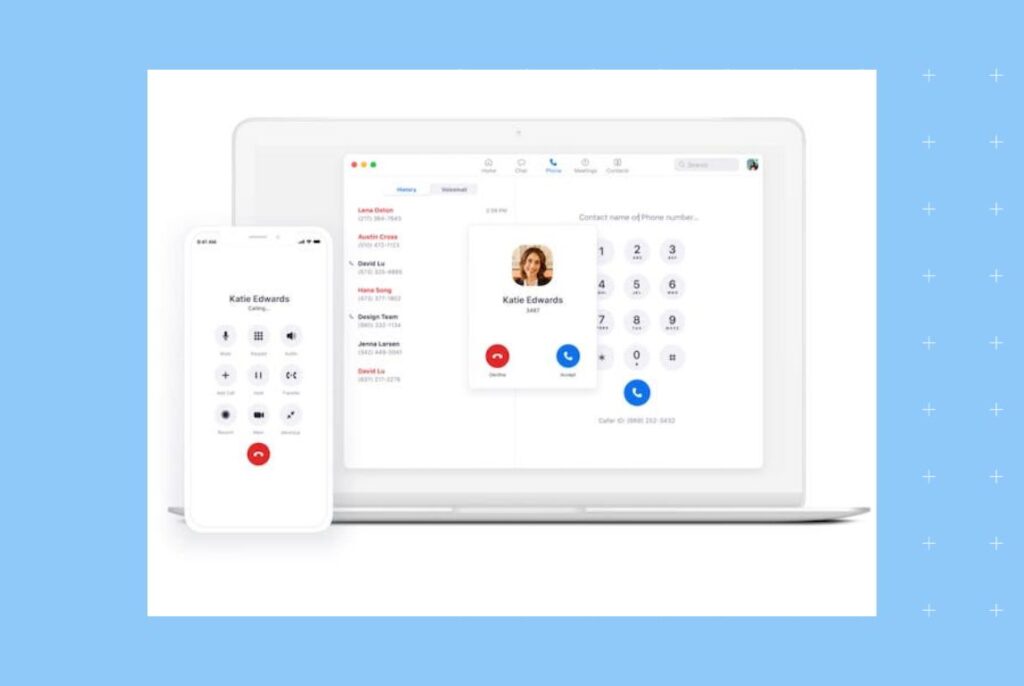
With this tool, businesses can:
- Make unlimited domestic and international calls (available for specific plans)
- Integrate phone systems with Slack, Hubspot, Google Workspace, and more.
- Get toll-free numbers at an additional cost.
- Manage calls with call forwarding, call recording, call routing, and other similar features.
While it does not have many features, Zoom Phone can be a decent VoIP service for small teams and startup businesses.
How much does VoIP cost?
VoIP service costs vary according to the number of users, the number of phone extensions, the type of service you choose, the additional services you choose (voicemail, call routing, and toll-free numbers), and the payment model. Here are a few vital aspects to consider:
- Most VoIP service providers bill on a subscription basis.
- Often, they also require a minimum timeframe commitment built-in in most cases.
- Your business can choose from monthly or annual subscriptions. Most service providers provide discounts with the annual subscription.
Some of the best VoIP services cost around $65/user/month, but you can find options starting from $20/user/month for simpler solutions. The phone extensions can cost anywhere from $150 to $500 per line.
Some factors that impact how much VoIP services cost are:
- Type of service: Cloud-based VoIP or softphone systems are usually less expensive than on-premises setups with fixed handset solutions.
- Features: The features you choose, besides the phone, video, and messaging, will impact the cost. Some VoIP services also charge extra for toll-free numbers, call recording, forwarding, or voicemail services.
- Number of users: VoIP service costs are a function of the number of users within the system. However, some VoIP service providers provide bulk pricing if the number is large.
- Payment model: If you’re willing to commit a minimum timeframe and pay in advance for a year or so, you can expect discounts and special offers, reducing the overall cost.
Leverage omnichannel communication with Birdeye
Want to reach customers across multiple channels seamlessly? Watch the Free Demo Now.
Pros and cons of VoIP: A close look at VoIP features and benefits
VoIP services are a good option for business phone management, but they have a few disadvantages, too.
This section provides an overview of the pros and cons of VoIP services to help you choose the best solution for your business.
Let us dive in.
| S.No | Pros of VoIP services | Cons of VoIP services |
| 1. | VoIP services are cost-effective in comparison to traditional phone systems. They offer cheaper options for international calling and other call management services. | For the best experience with VoIP services, businesses need stable and high-speed internet. VoIP systems can be challenging to manage if the internet connection is not up to the mark. |
| 2. | With VoIP systems, you can pick up calls from anywhere with call routing and forwarding facilities. This improves productivity in remote teams and reduces the reliance on fixed lines. | VoIP technology needs AC power like most digital devices. So, businesses have to invest in power backup systems for smooth operation. This can mean additional costs for a small business. |
| 3. | VoIP numbers are easy to move from one location to another, reducing the hassle of moving offices or locations. | As most businesses have remote workers, it is hard to guarantee stable internet and power backup at all locations. |
| 4. | Unlike traditional phone systems, VoIP systems have minimal downtime; some of the best VoIP services offer 99.99 and 100% uptime. | VoIP systems are vulnerable to security threats. While some VoIP services provide high-level encryption and security features, it is still a significant concern. |
| 5. | You can do more than just pick up calls and send messages with VoIP systems. Features like call forwarding, automatic call back, IVR, team messaging, video conferencing, AI assistants, and call analytics can significantly improve business performance. | VoIP systems use toll-free or virtual phone numbers, making it hard for emergency services to reach them when necessary. Without an E911 emergency address, this can hamper employee health and safety. |
| 6. | You can be available to customers 24/7 and be accessible, leading to an improved customer experience. | There are many compliance requirements for each operating location for VoIP systems, and businesses may need help to keep up with them. |
| 7. | VoIP systems do not need copper lines or any elaborate physical setup. They are easy to install and come in plug-and-play models for cloud-based VoIP systems. |
What are the various types of VoIP services?
VoIP services have evolved beyond just providing international calls and the ability to connect over the internet instead of the traditional phone systems. There are many types of VoIP services that you can now choose for your business:
- Hosted VoIP services
- Cloud-based VoIP services
- UCaaS
- UPaaS
- Fixed VoIP services
- Non-fixed VoIP services
Before we dive into how to choose the best VoIP service for your business, let us briefly explore the options available.
1. Hosted VoIP services
In hosted VoIP services, the business only provides the phone systems and the internet connection. All the VoIP system hardware is off-premise (not installed at your office) and maintained by the VoIP service. This model makes it easy for businesses that cannot appoint a team to maintain the service or lack the space for installation.
2. Cloud-based VoIP services
For businesses looking to go handset-free, cloud-based VoIP services come in handy. This option lets you communicate online while hosting everything on the VoIP service provider’s network.
Cloud-based VoIP services work as a plug-and-play model with minimal investment and installation process.
3. UCaaS
UCaaS is a “unified communication as a service” model. In this service, businesses can avail phone calls, audio/video capabilities for conferencing, team messaging, business messaging, and other advanced processes from a single service provider.
If you are looking for a VoIP model that gives you more than phone calls and messaging, this is the one.
4. CPaaS
Large businesses prefer solutions that integrate with their existing infrastructure and are customized to their needs. That is where CPaaS, or “communication platform as a service,” comes in. Service providers create unique solutions for business communication needs using VoIP technology in this model.
5. Fixed VoIP services
Businesses looking for reliable and stable VoIP services can choose fixed VoIP services as they work over a dedicated DSL or cable line. Since the internet connection is unique and is on-premise, this provides more stability to the business.
This model is one of the common types of VoIP services businesses use.
6. Non-fixed VoIP services
Businesses looking for flexibility and mobility options can consider non-fixed VoIP services. These operate on shared internet connections and are prone to disruptions or security issues. However, they are ideal for teams on the go.
How to choose the best VoIP service for your business
Most VoIP services offer similar offerings but differ in key features such as call-back features, pricing structure, customer support, etc. Since this is a substantial investment, evaluating services across multiple factors is essential.
Some of the essential factors to consider while choosing the best VoIP service are:
- Cost
- List of features
- Call quality and uptime guarantee
- Security features
- Customer support
Let us explore the steps to choose the right service provider.
1. Understand the costs involved
VoIP system pricing is complex and needs a thorough understanding of your requirements to make the right choice. Most service providers provide two-tiered pricing – a basic and enterprise plan so that you can pick based on what features you need.
However, you must also consider any expenses that may come up when you expand your business locations, add more employees, or need more features.
Some of the things to look at are:
- Costs for toll-free numbers, local number portability, and more.
- Add-on costs for onboarding a new user, location, or phone extension.
- Costs for including more features without having to upgrade the entire plan.
- Service and maintenance costs.
- Costs for international calls.
- Costs for third-party software integration.
2. Check the list of features and add-ons
Most VoIP phone system providers deliver the basics of phone calls, messages, and video calls. But you can do so much more with VoIP implementation for your business. So, evaluating each provider against the list of features available can help you narrow down choices.
Some of the important VoIP features to look out for include:
- Call forwarding and routing
- Call recording
- Unlimited domestic and international calls
- Virtual phone numbers
- Video conferencing
- VoIP CRM integration
- Interactive voice response
- Business messaging
- Team messaging
- Call transcription
- Call analytics with AI assistance
- Automatic call back
- Voicemail to text/email
- Virtual receptionist and hotdesk features
3. Evaluate call quality and uptime
This is one of the critical factors in choosing the best solution for your business. You should always pick the provider that can provide the best quality (no call drops/ patchy transmissions) and guarantee the highest uptime.
While you can talk to the sales team for assurances, the best thing is to look for customer reviews, talk to businesses that use the service (ask for references from the sales team), and get a free trial period.
4. Confirm security features
We know VoIP services are prone to security breaches, but most VoIP services now have extensive security features that protect you from these security threats.
Talk to the sales representatives to understand the encryption level, emergency features, firewall, and intrusion detection features.
The more security they can promise, the better.
Be sure to check customer reviews to evaluate their performance against security threats.
5. Customer support
A VoIP service is a crucial part of your business. For best results, choose a service provider that offers a dedicated account manager, 24/7 customer support, onboarding support, and helps with third-party software integration.
Most VoIP service providers offer customer support via phone, email, chat, and native app. Choose the one with flexibility, as that support will come in handy to keep your systems running smoothly.
Pick the right VoIP service with a tailored approach
While the VoIP market is filled with strong contenders, finding the right fit is key. Every business must carefully evaluate its communication needs to choose the VoIP service that aligns best with its objectives.
Frequently asked questions about best VoIP services
Yes, you can replace your landline with VoIP and save a considerable amount of money, enjoy better call quality, and explore the additional features of VoIP.
The best VoIP service depends on your needs, but RingCentral MVP, 8X8, Ooma Office, Zoom Phone, and Intermediate Unite are popular options.
Google Voice is a VoIP phone system that allows you to make free calls to almost all numbers in the USA and Canada. However, the platform may charge you for special numbers and international calls.
Grow your business with Birdeye Messaging
Streamlining communication has to be the #1 priority for every business. You want to put your best foot forward when speaking to customers and provide the best experience possible.
If you’re looking for an integrated communication solution for your enterprise for social media conversations, SMS, MMS, team chats, and answering missed voice calls, try Birdeye Messaging.
Birdeye uses VoIP and helps enterprises manage all conversations from a single dashboard, respond to messages on the go, and leverage AI to craft the most professional messages to their customers.

Originally published









